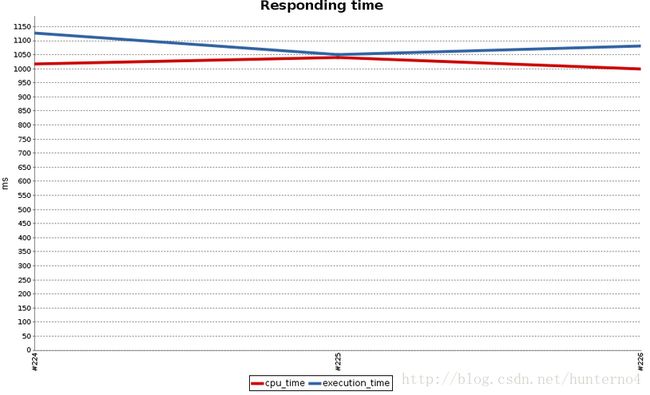Android应用性能测试
对于Web网页来说,页面的访问、加载速度对于用户体验来说是很重要的,而如果把Android中的每个Activity都看成是一个页面的话,Activity的启动速度凭主观的话是较难精确衡量的,因此如果可以测试每个Activity的启动速度或者获得其它基本指标并进行日常监测那就更好了。
一、编写继承于Instrumentation类的LaunchPerformanceBase类
/**
* Base class for all launch performance Instrumentation classes.
*/
public class LaunchPerformanceBase extends Instrumentation {
public static final String TAG = "LaunchPerformanceBase";
protected Bundle mResults;
protected Intent mIntent;
/**
* Constructor.
*/
public LaunchPerformanceBase() {
mResults = new Bundle();
mIntent = new Intent(Intent.ACTION_MAIN);
mIntent.setFlags(Intent.FLAG_ACTIVITY_NEW_TASK);
setAutomaticPerformanceSnapshots();
}
/**
* Launches intent {@link #mIntent}, and waits for idle before
* returning.
*/
protected void LaunchApp() {
startActivitySync(mIntent);
waitForIdleSync();
}
@Override
public void finish(int resultCode, Bundle results) {
super.finish(resultCode, results);
}
}在这个类的构造函数中setAutomaticPerformanceSnapshots()为Instrumentation设置为开启性能快照功能。
LaunchApp()方法中用于启动相应的Activity, waitForIdleSync()方法则为等待Activity空闲时,即等待Activity启动完毕。
二、编写ActivityLaunchPerformanceTest类
public class ActivityLaunchPerformanceTest extends LaunchPerformanceBase {
/**
* Outfile argument name.
* This argument can be passed to the instrumentation using
-e.
*/
private static final String launchActivityName = "launch_activity";
/**
* Output file name.
*/
private String classNameForIntent;
private String DEFAULT_ACTIVITY = "SplashActivity";
/**
* Constructor.
*/
public ActivityLaunchPerformanceTest() {
super();
}
@Override
public void onCreate(Bundle arguments) {
if ( arguments != null ) {
classNameForIntent = arguments.getString(launchActivityName);
}
if ( classNameForIntent == null ) {
classNameForIntent = DEFAULT_ACTIVITY ;
}
super.onCreate(arguments);
mIntent.setClassName("com.company.example",
"com.company.example.ui.activity." + classNameForIntent);
start();
}
/**
* Calls LaunchApp and finish.
*/
@Override
public void onStart() {
super.onStart();
LaunchApp();
finish(Activity.RESULT_OK, mResults);
}
}当开始测试时,Instrumentation启动,onStart方法执行时,运行LaunchApp()方法启动被测试的Activity.运行完成后finish。
Instrumentation退出,测试结束。
三、修改AndroidManifest.xml文件
在Manifest文件中增加Instrumentation申明
四、运行Activity启动性能的测试用例
adb shell am instrument -e launch_activity HomeActivity -w com.company.example.test/.performance.ActivityLaunchPerformanceTest测试结果大致如下:
INSTRUMENTATION_RESULT: other_pss=7437
INSTRUMENTATION_RESULT: java_allocated=4839
INSTRUMENTATION_RESULT: global_freed_size=2583696
INSTRUMENTATION_RESULT: native_private_dirty=1684
INSTRUMENTATION_RESULT: native_free=81
INSTRUMENTATION_RESULT: global_alloc_count=51608
INSTRUMENTATION_RESULT: other_private_dirty=5468
INSTRUMENTATION_RESULT: global_freed_count=18818
INSTRUMENTATION_RESULT: sent_transactions=-1
INSTRUMENTATION_RESULT: java_free=2784
INSTRUMENTATION_RESULT: received_transactions=-1
INSTRUMENTATION_RESULT: pre_sent_transactions=-1
INSTRUMENTATION_RESULT: other_shared_dirty=7300
INSTRUMENTATION_RESULT: pre_received_transactions=-1
INSTRUMENTATION_RESULT: execution_time=749
INSTRUMENTATION_RESULT: native_size=4772
INSTRUMENTATION_RESULT: native_shared_dirty=620
INSTRUMENTATION_RESULT: cpu_time=678
INSTRUMENTATION_RESULT: java_private_dirty=320
INSTRUMENTATION_RESULT: native_allocated=4690
INSTRUMENTATION_RESULT: gc_invocation_count=5
INSTRUMENTATION_RESULT: java_shared_dirty=1972
INSTRUMENTATION_RESULT: global_alloc_size=3883815
INSTRUMENTATION_RESULT: java_pss=2618
INSTRUMENTATION_RESULT: java_size=7623
INSTRUMENTATION_RESULT: native_pss=1699
INSTRUMENTATION_CODE: -1其它参数有兴趣的话可参照Instrumentation源码。
五、对测试结果进行文本处理
1.进行格式化处理
adb shell am instrument -e launch_activity HomeActivity -w com.company.example.test/.performance.ActivityLaunchPerformanceTest | sed 's/=/:/' | sed 's/ //' | sed 's/\r//'2.编写gawk脚本,名字为txt_to_xml.gawk
#!/bin/bash
BEGIN{
print ""
print ""
FS=":"
}
$2 ~ /execution_time|cpu_time/{
print " "
}最终执行测试用例的命令如下:
adb shell am instrument -e launch_activity HomeActivity -w com.company.example.test/.performance.ActivityLaunchPerformanceTest | sed 's/=/:/' | sed 's/ //' | sed 's/\r//' | gawk -f txt_to_xml.gawk > TEST-HomeActivity.xml
六、Jenkins结果展示
测试用例可以使用命令行方式执行,因此也就可以使用Jenkins完成自动化测试,且对于生成的单元测试格式的xml报告,可以使用Jenkins的Performance Plugin 插件进行图表化展示:
